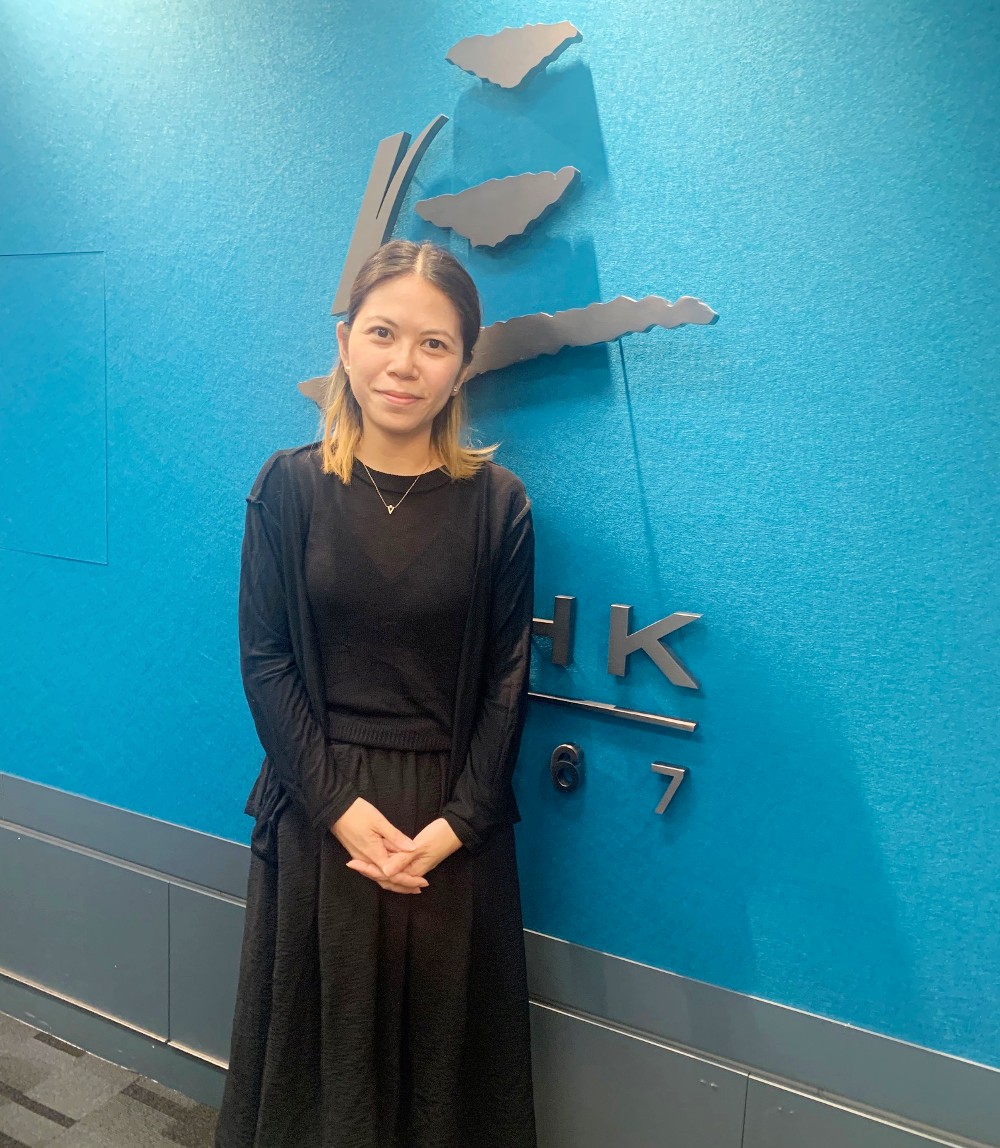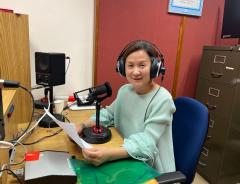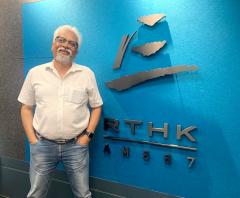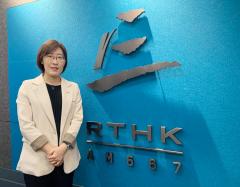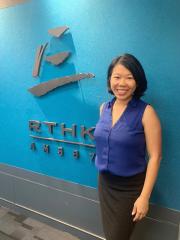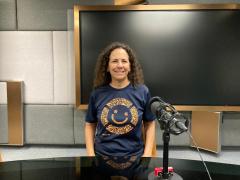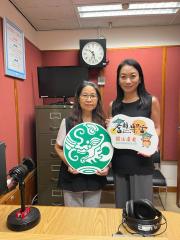簡介
Listen to #Hashtag Hong Kong every Sunday morning at 8.15
Focussing on issues affecting civil society, we'll hear from representatives of NGOs, associations, statutory bodies, and non-profit groups.
(Sundays 8.15am - 8.25am)
最新
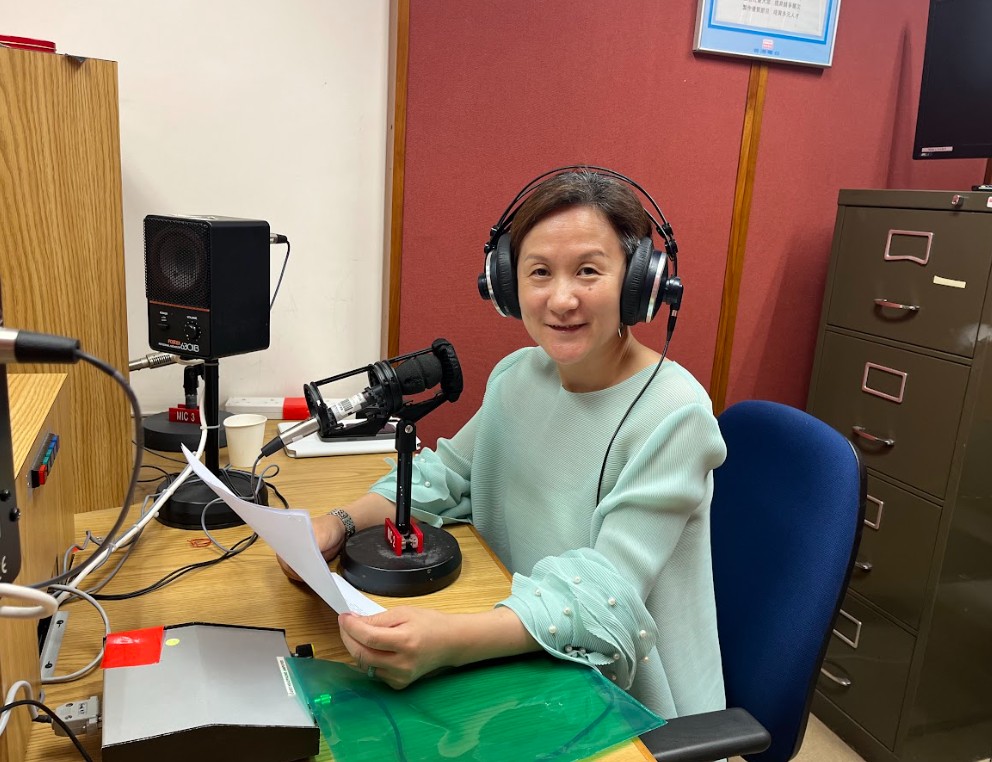
Vivian Lou, Director, Senior Citizen Home Safety Association
Good morning, everyone. I'm Vivian, Director of the Senior Citizen Home Safety Association and Professor in the Department of Social Work and Social Administration at The University of Hong Kong. Today, I’m going to share a little bit about a critical challenge facing Hong Kong's rapidly ageing population - the depression among older adults.
As you may be aware, Hong Kong is becoming an ageing society. More than 20% of our population is now 65 years old or above, and this percentage is expected to keep growing in the coming years. This demographic shift is creating significant challenges for our community, especially for our public health. One of the major issues is the high rate of depression among our senior citizens. Studies show that around 11% of Hong Kong's older adults suffer from at least one common mental health problem, and depression is a big part of that.
Why is this happening? The high rates of depression among older adults can be attributed to several key risk factors. Older adults often face multiple health challenges, ranging from chronic illnesses to physical limitations, which can significantly impact their mental well-being. Additionally, financial concerns, such as poverty and low income, can create significant stress and anxiety. Social isolation is another major contributor. Furthermore, the cognitive and functional declines associated with ageing can exacerbate feelings of helplessness and diminish an individual's ability to cope effectively. Even social culture could also be a factor that worsens the situation by discouraging older adults from seeking help. These factors can significantly impact an older adult’s overall well-being and quality of life.
Depression in older adults often presents differently than in younger populations. They may have common symptoms such as persistent sadness, anxiety, and difficulty concentrating. However, older adults are more likely to display cognitive changes and physical symptoms such as chronic pain or digestive problems, rather than the emotional symptoms we often associate with depression. This can make depression harder to diagnose and treat.
The good news is that there are effective ways to address depression in older adults. In addition to medication, community-based interventions and traditional practices like Qigong are often found to be effective approaches to treat depression in older adults. In Hong Kong, various local organisations are providing community-based mental health support to older adults. Let's take the Senior Citizen Home Safety Association's comprehensive 24/7 support service “Care-on-Call” as an example. This service has a team of registered social workers to take care of users’ emotions and mental well-being. We offer crisis assessment, emotional support, counselling, and information on community mental health resources. Through early screening and intervention, this service aims to prevent or alleviate the onset of major depression among older adults.
However, there's still a lot more that needs to be done. Given the rapid ageing of Hong Kong's population, the government may need to increase the availability of free or low-cost mental health services for older adults, so that more of those in need can access professional support. More resources for training social workers and healthcare professionals are also essential to better identify and manage mental health issues. Furthermore, the government should strengthen its collaboration with community organisations to focus on the mental well-being of our seniors. For example, they could encourage community centres and other groups to regularly host mental health talks and support groups, where older adults can come together, share, and find comfort in one another.
Ultimately, helping with depression in Hong Kong's ageing population is going to take a lot of different efforts. We need to make mental health less "shameful", empower communities, and ensure our seniors have the resources and care they need. It's a big challenge, but an important one we have to keep working on.
And to end on a positive note, I’d like to dedicate this song to all of you as I am a strong believer in the power of love. With love, we can! It’s called Ping Zhuo Ai by Julie Sue.
預告
Jamie Lau, Project Manager of Natural Parenting Network
Recently, the Equal Opportunities Commission released a report on breastfeeding at publicly accessible premises in Hong Kong. We from the Natural Parenting Network would like to share the challenges that breastfeeding mothers face and hope the public will better understand our needs and offer support and respect.
Breastfeeding not only benefits babies and mothers, but also families, and the workplace, as well as the society ultimately.
The success and sustainability of breastfeeding depend not only on the effort of mothers and babies but also how the support from their environment: the attitude of family members, societal views, the workplace arrangements when mothers return to work etc.
Breastfed babies receive natural antibiotics and other life-immune contents, especially during their vulnerable period before the age of 2. This reduces the risk of babies getting sick or hospital admissions, which subsequently decreases the need for parents to apply for leave to take care of their children. Parents then can focus more on their work and have high productivity, which is a win-win situation for the new families, organization and society.
Apart from physical benefits, breastfeeding also helps mothers and babies establish a close bond and attachment, leading to better emotional and brain development. Therefore there is an essential need for social support for breastfeeding families.
We realized that mothers are facing some difficulties:-
1 . Although many public venues provide baby care or nursing rooms nowadays, the number of facilities provided is far less to meet the demand. There may be 1 or 2 nursing rooms if lucky or it maybe only available on certain floors). But the number of families visiting the venue is not 1 or 2! We can imagine when a baby shows their early hunger signal, mothers need to find their way to the baby care facilities, which may take a 10-minute walk, only to find the room may be occupied, leading to a further waiting of 30 minutes or more.
2. Some nursing areas are designed to share with baby-changing stations. This would lead to a longer waiting time and queue for those who have real needs.
3. Sometimes misutilization occurs such as people occupying the nursing room for bottle/ formula feeding babies, having lunch, or other uses rather than breastfeeding! Some facilities management offices may lock the room for better control and avoid the above occurrence. When mothers reach the nursing room, they need to call the management office and wait for them to unlock the room. It is very inconvenient indeed and the purpose of establishing a breastfeeding room cannot be fully utilized.
The availability of breastfeeding facilities is only one of the difficulties that mothers face. There is also a lack of awareness and acceptance of breastfeeding. People think it’s just the same between breastfeeding and formula feeding and even may stop mothers from breastfeeding in open areas such as shopping arcades, restaurants, and parks etc. They even ask mothers to feed their babies in the washroom, which is inhumane. This can deter mothers from bringing their babies out even for a walk.
On the other hand, there are only guidelines issued by the government but not ordinances to monitor employers to provide certain designated breastfeeding periods and spaces. Therefore apart from families visiting public venues having their needs for breastfeeding facilities, some working mothers need to pump or express breastmilk at nursing rooms near their workplace, which increases the need for certain amount of breastfeeding rooms.
There is an increasing need for breastfeeding facilities in public and government premises. Government legislation on breastfeeding facilities requirements in newly built and refurbished premises can absolutely help to fulfil the demands. Relative stakeholders shall put an effort into supporting breastfeeding families. The developers can arrange breastfeeding facilities by re-arranging shops/ office areas in their existing premises, placing portable cube breastfeeding rooms can already help a lot. We think it is a social responsibility to offer support and respect to breastfeeding mothers.
The above-mentioned hindered mothers' continuous breastfeeding, especially after getting back to work. The attitude of the people around them is very important. How the public reacts to breastfeeding strongly affects mothers’ confidence and minds in sustaining their breastfeeding journey. We would recommend the government to promote and educate people that “breastfeeding is just that normal”, breastfeeding mothers are deserved to be respected and accepted. Mothers have the right to breastfeed their children anytime anywhere, even the breastfeeding facilities are not available, without being stared by strange eyes.
There are resources in the society that support breastfeeding mums. We are breastfeeding mothers and we provide peer support to expected and post-natal parents, the “Breastfeeding Peer Counseling Program” (in short “BFPC) is commissioned by the Department of Health. We organize workshops and deliver correct breastfeeding information via social media like Facebook, Instagram, WeChat, and YouTube. Mothers can also raise their enquiries by reaching out our hotline and WhatsApp group services.
Moreover, we recommend mothers download the mobile app “ Breastfeeding GPS” so that they can obtain the location of breastfeeding facilities nearby when they are going out with their babies or there is a need for a place for milk expression during work or away from their babies.
This morning, I’d like to dedicate the song Never Grow Up by Taylor Swift to all of you listening. Enjoy and Thank you
重溫
Innocent Mutanga, Founder and CEO of Africa Center Hong Kong
Good morning, my name is Innocent Mutanga, the Founder and CEO of Africa Center Hong Kong. Africa Center is a platform and creative hub that fosters value-creating interactions between African and non-African communities in Asia. Our mission is to bridge cultural differences and foster relations and cultural understanding between communities. We are a social enterprise dedicated to fulfilling the needs of our clients while promoting diversity and community representation.
Throughout our journey, we have collaborated with over 70 schools, reaching more than 50,000 students over the 5 years since our establishment. In addition to working with schools, we have formed partnerships with corporates, NGOs, consulates, and the general public.
One of the key goals at Africa Center is to challenge stereotypes and misconceptions surrounding black individuals in Asia. We call this campaign “Rebranding Blackness”. The struggles faced by black individuals living or visiting Asian countries are complex and multifaceted. We often encounter challenges such as stereotypes, discrimination, and a lack of representation. One of the most prevalent issues is the perpetuation of negative stereotypes about black people. Limited exposure and understanding have led some individuals to hold preconceived notions associating black individuals with criminality or low intelligence. These stereotypes result in biased treatment, social exclusion, and even harassment.
Discrimination against ethnic minorities in Hong Kong occurs in various forms, ranging from everyday microaggressions to more overt acts of racial prejudice. For instance, on my daily commute to the office, I often witness people choosing to stand rather than sit next to me on the MTR, even when there are empty seats available. This is just one example of the subtle forms of discrimination we experience. In more severe cases, ethnic minorities are denied housing opportunities solely based on their race. These microaggressions and racial prejudices not only have a socio-economic impact on our community but also take a significant toll on our mental well-being.
The employment prospects for qualified individuals from our community are hindered by anti-black biases in Hong Kong. Even highly talented individuals with advanced degrees may find themselves underemployed, working as dishwashers in restaurants due to these racial biases.
As a black person living in Hong Kong, my experience can be summed up in two words: caution and curiosity. We often encounter caution and fear from the older generations who unfortunately also hold the keys to our employment opportunities and access to grants and funding for starting businesses. On the other hand, we receive curiosity from the younger generation, who are more open-minded but vulnerable to influences from their parents and teachers. It is disheartening to discover that a significant number of students when asked if their parents warned them to be careful of black people before visiting our centre, raise their hands. Usually, 90% of kids raise their hands if we ask them if they have been verbally warned by their parents to be careful of us prior to the workshop. This demonstrates the extent of the misconceptions that persist in society.
However, there are heartwarming encounters that remind us of the potential for change. For example, a Chinese boy who attended our African Kidz club expressed his love for our food and suggested having a Fufu Festival in Hong Kong. Additionally, there was an instance where a child approached me on the MTR, and we started playing together, just like any other African child would. I was pleasantly surprised when the parent didn't intervene. Unfortunately, such situations are rare, and most parents tend to quickly remove their children from these interactions. These small enlightening moments give people like me the incentive to strive for change and challenge the negative perceptions of Africans and ethnic minorities. As Nelson Mandela once said, "No one is born hating another person because of the colour of his skin, or his background, or his religion. People must learn to hate, and if they can learn to hate, they can be taught to love, for love comes more naturally to the human heart than its opposite."
Despite Hong Kong's diversity, stereotypes, biases, and discrimination persist within society. As a political refugee who has experience navigating and overcoming complex systems, I am committed to assisting others; Refugees and non-refugees are alike who are faced with complex systems in their lives that make it hard or even impossible to survive, live or thrive
Education has the power to challenge prejudices, dismantle barriers, and promote inclusivity. By providing resources, mentorship, and support, we can empower marginalized communities and foster a more equitable society. Through awareness, dialogue, and collaboration, we can create a Hong Kong that embraces diversity and upholds justice and equality.
Our immediate goals are twofold. Firstly, we aim to connect with open-minded teachers, company leaders, and community figures who are willing to make a social impact by inviting us to their respective communities, schools, or churches. This will allow us to share our experiences and cultures, helping to create a more inclusive society for Africans and other ethnic minorities in Hong Kong. Secondly, we hope to obtain resources such as funding and skilled volunteers to support our initiatives directly benefiting the African and ethnic minority communities, including career workshops, networking opportunities, and entrepreneurship training.
In conclusion, it is crucial for the government and our community to take collective action to improve the care and support for ethnic minorities in Hong Kong. By fostering inclusivity, challenging stereotypes, and providing equal opportunities, we can create a society that values diversity and upholds the principles of equality and inclusion. Thank you for your time and for considering our message. We believe that together, we can make a difference and create a more inclusive and accepting Hong Kong. As a token of appreciation, we would like to dedicate a song to the people of Hong Kong. The song is called “Amani” by one of my favourite bands called Beyond. A song with Swahili lyrics (an East African Language) by a band that would go above and beyond to extend a hand to support other groups' struggles with their visits or music. I hope that this song resonates with you and encourages you to maintain Hong Kong’s “Beyond Spirit”!
Thank you!





